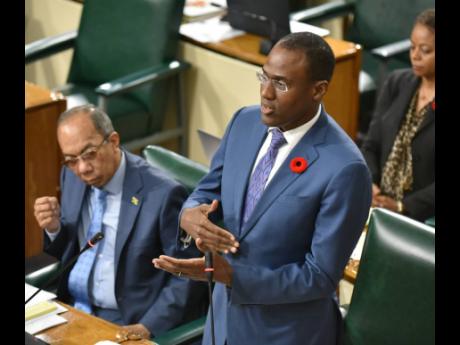$60b Budget bounce
One-third of increase to cover public-sector compensation
The Government on Tuesday formally increased the national Budget by $60 billion, or 6.6 per cent, in part to counter the shocks of inflation and fuel hikes largely caused by commodity disruptions in Eastern Europe.
These effects of the Russian invasion of Ukraine have forced countries to seek ways of cooling inflation to reduce the economic strain on populations, Finance Minister Dr Nigel Clarke said in an address to lawmakers on Tuesday.
“Jamaica is among those countries. The unprogrammed response to the impact of the Russia-Ukraine conflict on the country, which was required, is among the factors necessitating the tabling of this First Supplementary Estimates,” said Clarke in the House of Representatives.
The revised Budget now stands at $971.98 billion, up from the original $912 billion outlined in the First Supplementary Estimates 2022-2023, which was tabled on Tuesday.
Clarke explained that the increase in expenditure and payments of $60 billion comprises $52.7 billion for non-debt recurrent expenditure, $1.3 billion for capital expenditure, and $6.0 billion for debt service.
The finance minister said that the increased spending was made possible by better-than-expected revenue inflows $65.5 billion above budget.
“The performance of revenues over the first half of the fiscal year has been significantly better than budgeted, reflecting the higher-than-anticipated recovery of the economy from the impact of COVID-19 as well as the higher-than-expected inflation,” he said.
Inflation over 12 months to April totalled 11.78 per cent, or among the highest in a decade. Up to September, inflation cooled to 9.3 per cent, but it is still higher than the target set by the authorities of between 4.0 to 6.0 per cent.
“Jamaica has continued to perform well within the context of disrupting events that have had negative impacts globally and the Government has sought to utilise that performance such that those most affected receive some level of assistance, while ensuring that the country gets back on track towards the legislated fiscal objectives,” Clarke said.
Just over half of the increase, or $32 billion, will go towards programmes in the Ministry of Economic Growth and Job Creation, Ministry of Health & Wellness, Ministry of National Security, Ministry of Science, Energy and Technology, and Ministry of Labour and Social Security.
One-third of the increase, or $21.1 billion, will go towards the compensation of public-sector employees. Clarke explained that this arises from wage discussions with public-sector unions and staff associations. Also contributing to the increase in compensation of employees is an amount of $2.2 billion requested by the Ministry of Health & Wellness to facilitate the payment of allowances.
A closer look at the ministries and departments shows net allocations that, in part, address the social decay that arose from the economic fallout from the COVID-19 pandemic.
The Ministry of National Security will receive the largest allocation, with a net increase of $6.0 billion, including the Jamaica Defence Force, $1.5 billion; the police, $3.3 billion; and the Department of Correctional Services, $862 million.
The Ministry of Economic Growth and Job Creation will receive a net increase of $5.1 billion, of which $1.4 billion is to support islandwide drain cleaning, bush clearing, and minor repairs to gullies; and approximately $3.9 billion for patching, local and general rehabilitation of scoured and damaged roadways.
The Ministry of Health will receive a net increase of $3.6 billion to support the payment of arrears for goods and services in the regional health authorities (RHAs) and the procurement of drugs and medical supplies.
The Ministry of Transport and Mining will receive a net increase of $1.1 billion for the Jamaica Urban Transit Company towards the company’s fuel costs, lubrication, and toll charges.
The Ministry of Education will receive a net increase of $2.2 billion. That includes $530 million to supply laptops to teachers under the heads of agreement with the Jamaica Teachers’ Association; $592 million towards the production of breakfast and snacks for vulnerable students under the PATH welfare system; $140 million to support critical repairs in identified schools; and $270 million towards the expansion of broadband in schools, executed by the e-Learning programme.
The Ministry of Labour and Social Security will receive an additional $1.1 billion, which relates to an 18 per cent increase in the regular cash grants paid to PATH beneficiaries.

